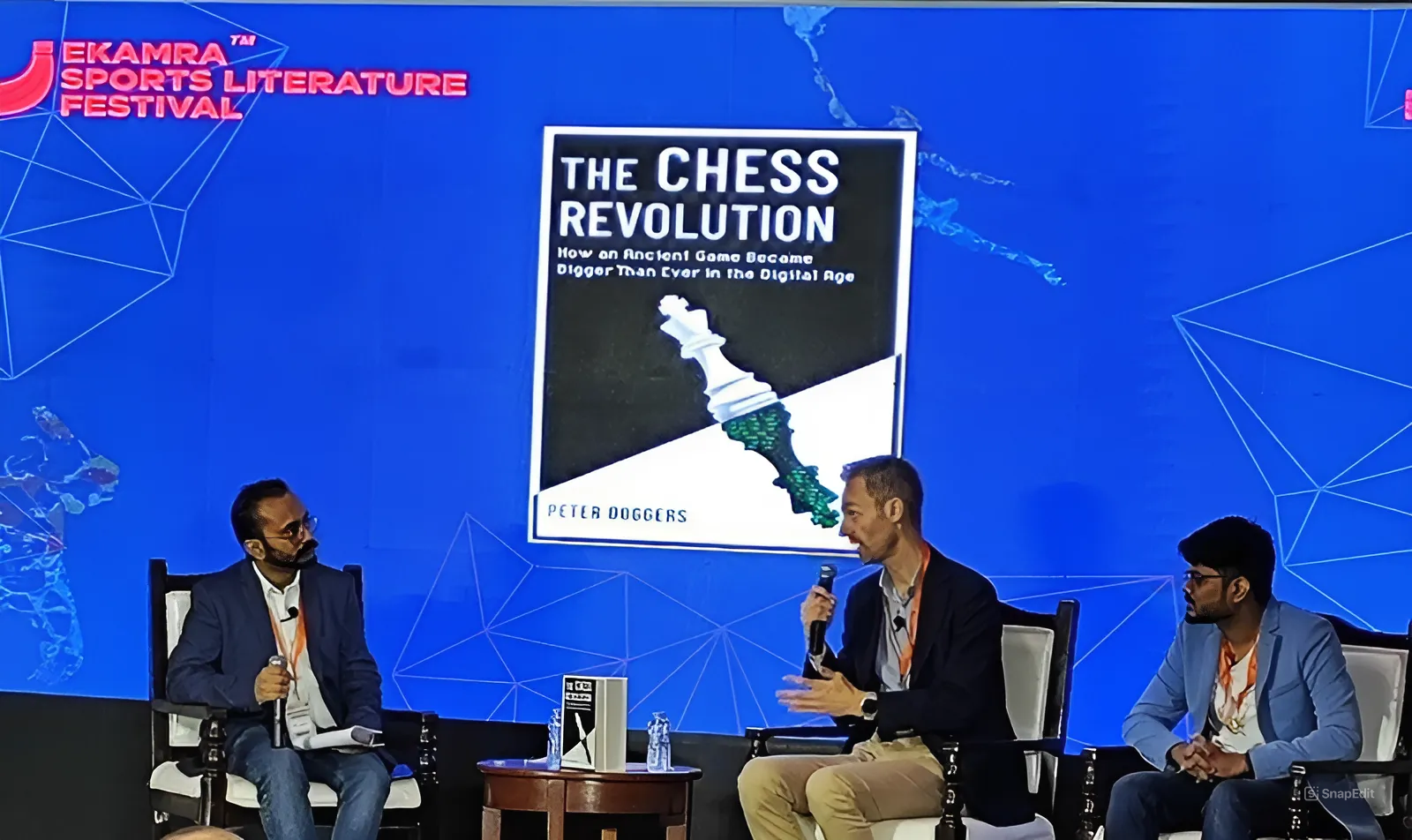The Chess Revolution: India’s Growing Influence in the Global Arena
New Delhi: The world of chess has undergone a transformation, especially with India emerging as a powerhouse on the global stage. The ongoing session titled “The Chess Revolution,” held at the Ekamra Sport Literature Festival examined the cultural evolution of chess, from its historic roots to its digital age resurgence. The session was graced by Peter Doggers, journalist and author of The Chess Revolution, who flew in from Amsterdam, to talk about the book that traces the game’s influence on popular culture, the arts, science, and its dramatic moments.
Joining him on the panel were prominent figures in Indian chess, including Grandmaster Shrinath Narayanan, a former coach to prodigies like Nihal Sarin and Arjun Erigasi, and Women’s Grandmaster Divya Deshmukh. The session was moderated by Amit Kamath, Assistant Editor at Indian Express, who has been a consistent voice in covering the intricacies of the chess world.
The panel discussed the exponential rise of Indian players on the world stage, with three Indians now ranked in the top 10 globally. As the game of chess grows in stature, it’s clear that India’s players are setting the bar. An 18-year-old prodigy, Gukesh, is poised to make history in the coming days by making an audacious bid to become the youngest World Chess Champion ever, a feat that has eluded even the likes of Garry Kasparov and Magnus Carlsen.
The Rise of India in Chess: Factors Behind the Success
Grandmaster Shrinath Narayanan offered valuable insights into the factors that contributed to the rise of India in the world of chess. He pointed out that unlike other sports, where the infrastructure requirements are high and challenging, chess offers a unique advantage—it is incredibly accessible. All one needs is a mobile phone and internet access, tools that are becoming increasingly available across India.
He further noted that India’s chess resurgence can be traced back to the influence of Viswanathan Anand, who broke barriers in the 80s and 90s, proving that Indians could dominate the global chess scene. Anand’s pioneering spirit ignited the passion for the game among millions of Indian youth, leading to an influx of talented players.
This surge of talent has been nurtured over time, with players like Gukesh starting their chess journey at an incredibly young age. Becoming a Grandmaster at the age of 12, Gukesh has already surpassed milestones that were once considered distant goals for most players. For his generation, the journey begins at a much earlier stage, with Grandmaster titles being just the beginning.
The Secret to Gukesh’s Success
Shrinath elaborated on what sets Gukesh apart from his peers: “You need to win the genetic lottery, but you also need the ability to adapt quickly. Gukesh’s ability to learn and implement changes rapidly has been a key factor in his success,” Shrinath said. He emphasized that Gukesh, even in his teenage years, has shown extraordinary focus, discipline, and self-awareness, qualities that are rare among super talents.
The discussion also touched on how physical fitness plays a crucial role in a chess player’s performance. Gukesh takes physical fitness seriously, something that not all top players prioritize. His disciplined approach to training and his dedication to improving his mental and physical endurance has been key to his rapid ascent in the chess world.
Technology’s Role in Shaping Future Chess Stars
The role of technology in shaping the new generation of chess prodigies was another important topic of discussion. With chess now being more accessible than ever, platforms like Chess.com and Lichess have played a pivotal role in honing young talent. Online training, AI-powered game analysis, and the ability to play against top players from across the world have allowed Indian players, especially from smaller towns, to compete at the highest level.
Peter Doggers, who has closely followed the game’s evolution, discussed how digital platforms have brought about a chess revolution, enabling players to learn and evolve faster than ever before. “Technology is bridging the gap between chess enthusiasts and top-level players,” Doggers remarked.
As Gukesh prepares for his World Championship bid, the excitement surrounding India’s growing dominance in chess is palpable. The coming weeks will be a defining moment for Indian chess, as the country’s youngest prodigy stands poised to potentially change the course of chess history.
The Chess Revolution is not just about the rise of Indian players, but about the game itself, which continues to captivate and inspire millions around the world. The session highlighted that with the right tools, talent, and determination, the future of chess will be dominated by the next generation of Indian players.
As the digital age continues to reshape the world of sports, chess remains a testament to the power of strategy, intellect, and adaptability—traits that will continue to define India’s rise in the global chess arena.
Chess: The Evolution of a Timeless Game Through Technology and Human Genius
In the world of chess, technology and human skill have always intersected, evolving together to create the game we know today. In his new book The Chess Evolution, Peter Doggers explores how this ancient game, which originated in India as Chaturanga over 1,500 years ago, has undergone dramatic changes, particularly in the last few decades. By diving deep into the influence of artificial intelligence (AI), neural networks, and the internet, Peter traces the game’s journey from a regional pastime to a global competitive sport.
“Chess has always been about the mind and the art of prediction, but with the advent of computers and neural networks, it’s evolved into something even more sophisticated,” says Doggers. The game’s transformation, however, is not solely a product of technology. It also includes cultural and scientific influences, ranging from literature and art to cinema and the natural sciences. These elements, he argues, have not only shaped the way chess is played but also how it is perceived and celebrated in society.
The rise of AI in chess can be traced back to the mid-20th century when pioneers in the field of artificial intelligence used chess as a testing ground for computational strategies. From IBM’s Deep Blue defeating Garry Kasparov in 1997, to the recent prominence of neural network-powered engines like AlphaZero, technology has drastically altered the landscape of professional chess. These advancements have created a new type of player—one who, while relying on innate talent, can also leverage machines to improve their game.
However, Peter stresses that the balance between human intuition and machine analysis remains delicate, especially in long-duration games. In classical time-controlled matches, players are given several hours to think and make their moves, allowing for deep, deliberate strategy. “The longer the time control, the more influence the computer has,” explains Doggers. Magnus Carlsen, the reigning World Champion, has been vocal about this shift, opting to step away from the World Championship cycle to focus on faster time controls where human creativity plays a larger role.
Yet, even in the rapid and blitz formats, computers are an ever-present influence. Players today spend months preparing, using AI to analyze opening strategies and improve their endgame technique. In fact, the intense preparation required to compete at the highest level has led to a new kind of chess athlete—one who combines physical endurance with mental agility. As Peter points out, games can last up to seven hours in classical formats, demanding peak physical condition from the players.
While the technological evolution of chess is undeniable, the human element remains at the core of the game. In his book, Doggers also explores the debate on who is the greatest chess player of all time. He considers Bobby Fischer’s revolutionary impact, Kasparov’s dominance over the chess world for nearly two decades, and Carlsen’s ongoing reign at the top. “Fischer was ahead of his time, while Kasparov’s legacy is rooted in a longer period of dominance,” Doggers says. “Magnus is undoubtedly playing the best chess we’ve ever seen, but his era is still unfolding.”
The convergence of tradition and technology has made chess more accessible than ever. Online platforms have opened the doors for millions to engage with the game, and the widespread use of computer analysis has made learning more efficient. However, as Peter notes, there is a fine line between enhancing one’s skills and relying too heavily on technology. “The ultimate challenge is to blend the precision of the machine with the creativity of the human mind.”
With AI now integrated into every facet of the game, the future of chess looks increasingly intertwined with technology. But as Haringa concludes, “No matter how advanced the technology becomes, chess will always be a human game at its core. It’s the human imagination that ultimately drives the innovation of the game, making each new move a part of its rich, evolving history.”
The Evolution of Chess Engines and Their Impact on Players and Coaches
In recent years, the rapid development of chess engines has had a profound impact on the way the game is played, analyzed, and coached. What was once a tool of assistance has transformed into an indispensable part of the chess ecosystem, influencing players, coaches, and even the public perception of the game.
The Rise of Engine-Assisted Chess
For the past few decades, chess engines have been steadily improving, becoming far stronger and more reliable. In the mid-1990s, when computers first began to challenge human players, they were seen as a novelty. They could suggest moves, but were not always accurate. For example, in the famous 1995 match between Garry Kasparov and Vishwanathan Anand, Kasparov used a computer program, Fritz, to check his move after sacrificing a rook. The program validated his decision, enabling him to win the game.
However, it wasn’t until the late 2000s that computers began to evolve into serious tools for chess players. In 2006, commercially available software such as Rybka began outperforming even the best human players. Still, it wasn’t perfect, and players had to learn to interpret the suggestions intelligently. It wasn’t until the 2010s that these engines began to be seen as near-absolute authorities on chess positions.
AlphaZero: A Game-Changer for the Game
The breakthrough moment came in 2017, with the advent of AlphaZero, an AI-powered program developed by DeepMind. AlphaZero learned how to play chess by playing against itself, and within a matter of hours, it surpassed the performance of any human player in history. In just four hours, it achieved mastery, rewriting the way players and coaches thought about chess.
This shift raised existential questions for many who had devoted their lives to mastering the game. “I felt almost worthless,” admits one coach, reflecting on the moment AlphaZero outpaced human abilities so quickly. Yet, rather than replacing humans, these engines have modified their roles. AI no longer dominates; it assists. Players and coaches now use engines not just to check moves but to gain insights into positions, train, and develop strategies.
From “God-like” Machines to Trustworthy Tools
Initially, the influence of computers on chess was overwhelming. Players treated them almost as divine sources of wisdom. But the relationship has evolved. While the engines’ capabilities are still unmatched, younger generations now see them as powerful tools, not as infallible guides. They understand that AI’s suggestions, while brilliant, often need human interpretation to be fully utilized.
“The biggest change in the last decade is that computers are no longer seen as an infallible authority,” says the coach. “They are seen as partners. The human mind is still needed to make decisions, especially when you play against other humans. Chess is not just about finding the best move; it’s about understanding the psychology of the game and outwitting your opponent.”

In a recent example, a coach noted that while a chess engine might suggest a “perfect” move in any position, the move’s success in a real game depends on the player’s style and the opponent’s mindset. The coach elaborated that while AI might solve a position in seconds today, humans are still required to inject creativity, emotion, and strategic thinking into their play.
The Role of Coaches in the Age of AI
As AI becomes an integral part of training, the role of the coach has evolved significantly. The coach’s job is no longer just to impart knowledge about openings, endgames, or tactics. Now, coaches are tasked with helping players understand how to combine human ingenuity with the cold precision of computers.
Coaches must adapt, learning to use these engines not as replacements for human creativity but as supplements. They help players focus on the human aspects of the game, such as intuition, psychological pressure, and adaptability — qualities that a machine can’t replicate.
“We still need human creativity,” says the coach. “Computers might show you the best way to play, but the heart of chess is the human element — your ability to surprise your opponent, your emotional intelligence, and your ability to create opportunities out of difficult situations. This is where we need to focus.”
A New Era of Chess
As we enter this new era of AI-enhanced chess, the game is experiencing a renaissance. Engines like AlphaZero and Stockfish are pushing players to new heights, challenging them to think in ways that were previously unimaginable. Chess is no longer just about memorizing moves; it’s about understanding the deeper principles behind them, and how to adapt those principles to ever-changing human dynamics.
The future of chess is undoubtedly tied to technology, but the essence of the game — the human spirit, creativity, and competition — remains as strong as ever.
The Impact of Internet and AI on Chess: A New Era in the Game
In a fascinating discussion, chess experts have shed light on how the internet and artificial intelligence (AI) have revolutionized the game, forever changing how players learn, strategize, and compete.
Before the rise of the internet in the early 1990s, chess was a game reliant on books and magazines for learning and sharing information. Detailed encyclopedias and annual volumes, like the Chess Informant, were essential tools for players, offering comprehensive databases of games played by grandmasters. These volumes were incredibly bulky and often required players to carry multiple suitcases packed with books and reference materials during tournaments. This was the only way to access valuable information about opponents and past games.
The advent of the internet marked a monumental shift in this tradition. One key figure in this transformation is Mark Crowder from Britain, who in 1994 launched an online magazine that revolutionized how chess games were shared. His platform collected games from around the world and made them available for free in downloadable files. This breakthrough made chess information far more accessible and played a critical role in the digital transformation of the game.
Today, chess tournaments are played on digital boards that automatically record and publish games online, making it easier for enthusiasts and players to follow and analyze matches. Crowder’s initiative paved the way for this new age, where accessing and storing vast amounts of game data has become a seamless process. Professional players now carry an entire library of games on their laptops, including databases with millions of games—replacing the heavy books of the past.
AI has further augmented this transformation. One of the most notable advancements in recent years is AlphaZero, developed by DeepMind, which can teach itself chess through trial and error. AlphaZero’s playing style is noted for its aggressive, intuitive approach, similar to legendary grandmasters like Garry Kasparov and Mikhail Tal. This style, along with AlphaZero’s ability to rapidly improve through self-play, has raised important questions about the future of human chess players. The AI’s ability to discover new strategies that humans had not thought of has made it a formidable player, with its games against the strongest human-engine combinations leaving a lasting impact on the chess world.
The increased flow of information and the integration of AI in chess has also led to the rise of online tournaments. Platforms like Chess.com host events such as “Title Tuesday,” where top players compete for cash prizes. These online tournaments have made it easier than ever for players to compete frequently, sometimes playing over 700 games per year compared to just a few hundred in the pre-internet era. Even elite players like Magnus Carlsen and Hikaru Nakamura participate in these digital events, blending traditional chess with the fast-paced world of online gaming.
With these advancements, the traditional barriers to information access in chess have been all but eliminated. The combination of the internet, AI, and vast databases has fundamentally changed the way chess is played, studied, and enjoyed by millions around the globe.
As the game continues to evolve, experts suggest that the next frontier for chess lies in the development of even more advanced AI tools and platforms, capable of further enhancing player performance and expanding the limits of what is possible in the game. In this new era, chess is no longer just a battle of minds across a physical board; it is a digital and intellectual revolution that is reshaping the game for future generations.
Chess on the Rise: A Glimpse into the Future of the Game
As chess continues to soar in popularity, its global reach has expanded rapidly with platforms like Chess.com now boasting over 170 million members. The growth of online chess has fueled a revolution in the way the game is played and consumed, with millions of games happening every day. Whether it’s on an airplane or during a commute in the metro, it’s not unusual to spot players engrossed in a chess game on their phones, solidifying chess as an integral part of modern entertainment.
However, it’s not just online chess that’s contributing to the sport’s increasing popularity. Experts believe that the upcoming World Chess Championship, where reigning champion Magnus Carlsen faces off against challenger Ding Liren, could be a defining moment for the game. Magnus Carlsen, who has been in stellar form over the last year, is considered the favorite to win, although many acknowledge the mental and emotional toll the game can take on its participants. Ding Liren, in particular, has faced personal struggles that have raised questions about his mental readiness for such a high-pressure tournament.
One thing is clear—this match will be determined by the psychological dynamics between the two players. Carlsen’s consistency and confidence have made him a dominant figure, but if Ding can find his rhythm early in the match, we could be in for an exciting battle.
The chess world has also seen the emergence of modern formats and new methods of preparing for competitions. While players today have access to cutting-edge technology, such as computers and AI, there was a time when chess was a game of pure intellect, where even the greatest minds like Bobby Fischer stood out for their unmatched brilliance. Fischer, known for his genius and eccentricity, remains one of the most iconic figures in chess history. His contributions to the game during the 1972 World Championship against Boris Spassky were revolutionary, and many consider him one of the greatest to ever play the game.
Fischer’s era was devoid of the technological tools players have today, and yet he outperformed his opponents with sheer knowledge and resourcefulness. His ability to study the game without modern analysis tools made him a true pioneer of his time. In contrast, today’s players benefit from sophisticated tools, but Fischer’s legacy of individual brilliance still looms large in the chess community.
Now, as chess enters a new era with its growing fanbase, there are plans to take it to even greater heights. In 2025, Netflix will release a documentary series on chess, following in the footsteps of shows like Breakpoint in tennis and Sprint in athletics, which have done much to popularize their respective sports. These productions are expected to open chess up to a broader audience, drawing attention from a new generation of fans who are eager to learn more about the game and its stars.
With an internet boom fueling the growth of online chess and more media attention than ever, the future of chess looks bright. As the sport continues to evolve, it seems poised for even greater achievements, both on the board and off.
The Surge in Chess Popularity and India’s Role as a Future Powerhouse
In the recent discussion, experts also reflected on the significant rise in global interest in chess, particularly driven by the pandemic and the cultural impact of The Queen’s Gambit series. The period between late 2022 and early 2023 saw the peak of what was described as the “third wave” of chess’s popularity, ignited by multiple factors that are too complex to explore in full detail. However, it’s clear that The Queen’s Gambit, coupled with the lockdowns of the pandemic, played a crucial role in making chess accessible and intriguing to a new generation of enthusiasts.
The speakers highlighted that the surge in chess interest was more than just a temporary trend. The pandemic acted as a catalyst, forcing many people indoors and prompting them to explore new hobbies. The Queen’s Gambit, a widely successful miniseries, introduced millions to the world of competitive chess and reignited global fascination with the game. It not only entertained audiences but also educated them about the intricacies of chess, drawing many to participate in online chess platforms and to engage with the game in a way that hadn’t been seen before.
India’s role in this global resurgence was particularly emphasized. Experts pointed out that the country has firmly established itself as the future of chess, with a rapidly growing pool of talent and a strong tradition in the sport. India’s performance in international chess events and the emergence of top-level players have positioned it as a dominant force in shaping the future of the game.
In conclusion, the session ended with a sense of optimism, underscoring that India is at the forefront of chess’s next phase. The future of chess, they said, is not only bright but is already being shaped in India. The event concluded with a photo opportunity, following which a brief technical break was scheduled. This conversation reaffirms that the chess world is evolving, with India playing an integral role in its exciting future.





